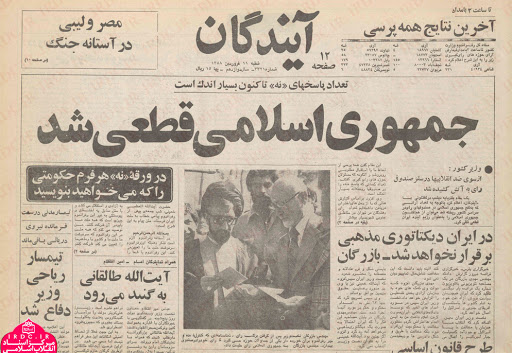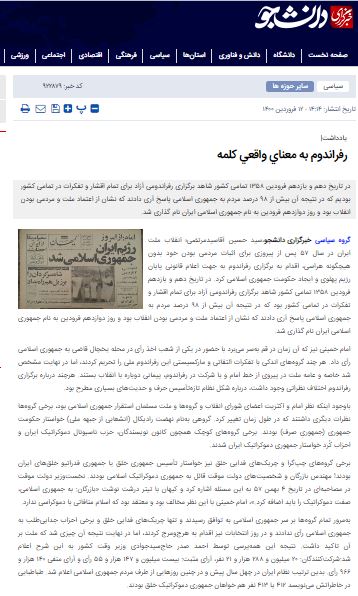Student News Agency Political Group, Seyed Hossein Aghasid Morteza; The Revolution of the Iranian Nation in 1957, after its victory, to prove its popularness without any fear, held a referendum to legally announce the end of the Pahlavi regime and the establishment of the Islamic Republic. On the 10th and 11th of Farvardin 1979, the whole country witnessed the holding of a free referendum for all classes and thoughts in the whole country, as a result of which more than 98% of the people answered yes to the Islamic Republic, which showed the nation's trust and popularness. Froudein was named after the Islamic Republic of Iran. Imam Khomeini, who was living in Qom at that time, also voted for the Islamic Republic by attending one of the polling stations in the Yakhchal Ghazi neighborhood. Although a few groups boycotted the national referendum with their pious and Marxist views, it eventually became clear that the nation in particular, following the Imam's line and participating in the referendum, made a new pact with the revolution. Although there was disagreement about holding a referendum, there was much talk about the form of the newly established system. Although the views of the Imam and the majority of members of the Revolutionary Council and groups and the Muslim nation were on the establishment of the Islamic Republic, some groups had other views that changed over time. A group called the Radical Movement (a split from the National Front) called for a republican government. Some small groups, such as the Writers' Association, the National Democratic Party of Iran, and Kurdish parties, called for a democratic republic of Iran. Some leftist groups and Fada'i Khalq guerrillas also demanded the establishment of the People's Republic or the People's Federation of Iran! Bazargan Engineer and the figures of the Provisional Government believed in the Islamic Democratic Republic. The Prime Minister of the Provisional Government referred to this issue in an interview on February 25, 1957, and Kayhan wrote with a big headline, "Bazargan: Democratic character must be added to the Islamic Republic." Imam Khomeini disagreed with this view and believed that Islam was in conflict Not with democracy. Eventually, all groups agreed on the Islamic Republic, and only the People's Fedayeen guerrillas and some separatist parties did not vote for the Islamic Republic, and chaos ensued on election day, but in the end the result was what the nation insisted on. The result of this referendum was announced by the then Minister of Interior Ahmad Sadr Hajjid Javadi as follows: Participants: 20 million 288 thousand 21 people, positive votes: 20 million 147 thousand 55 votes and negative votes 140 thousand 966 votes. Thus, the Iranian regime was declared by the people of the Islamic Republic forty years ago and on such days. Tabatabai writes in his memoirs that 412 or 413 people also wanted a People's Democratic Republic
.

The structure of the newly established government after the revolution had never been created with this form anywhere in the world, and the Islamic Republic was a new experience of establishing a pure Muhammadan Islam on the structure and framework of power, in a society where the majority wanted such a structure. The democratic structure based on the votes of the nation in the seventies and eighties was not very familiar, especially for the Middle Eastern countries, and the Islamic Republic was able to create the infrastructure for the masses to feel their identity as citizens, because before that only mandated elections in Iran. It was common to insult the views of the people instead of respecting the national vote. The achievement of the ballot box for the Iranian nation was an important political fruit of the revolution that has maintained its order and health in twelve terms of presidency, eleven terms of parliament, five terms of city council and five terms of elections of leadership experts. Forty-two years after the incident, the Islamic Republic is still steadfast in its commitments and moving in the direction of national and Islamic interests. It is difficult and detailed to go into the details of the progress and achievements of this unprecedented government in the history of the work, and perhaps it is enough to point out that the Islamic Republic has not deviated from its path after this year, but despite the oppressive sanctions, the eight-year war , Foreign intervention and unrest have been able to maintain power in the turbulent Middle East, a remarkable example of stability and progress. One of the most important achievements of the Islamic Republic's foreign policy is its strategic presence in the countries of the region, which in recent years, while providing security for the country's borders, has also contributed to the stability of the countries in the region and improving the situation of Muslims and Shiites. This form of government, which is based on Islam and national votes, will definitely be studied and admired in the mirror of history as a successful example for progress, stability, consensus building, independence, freedom, and so on. This year, on the forty-second anniversary of that glorious event of the Islamic Republic, is on the eve of the thirteenth presidential election, and continues to maintain its cohesion in protecting and relying on the nation's vote



